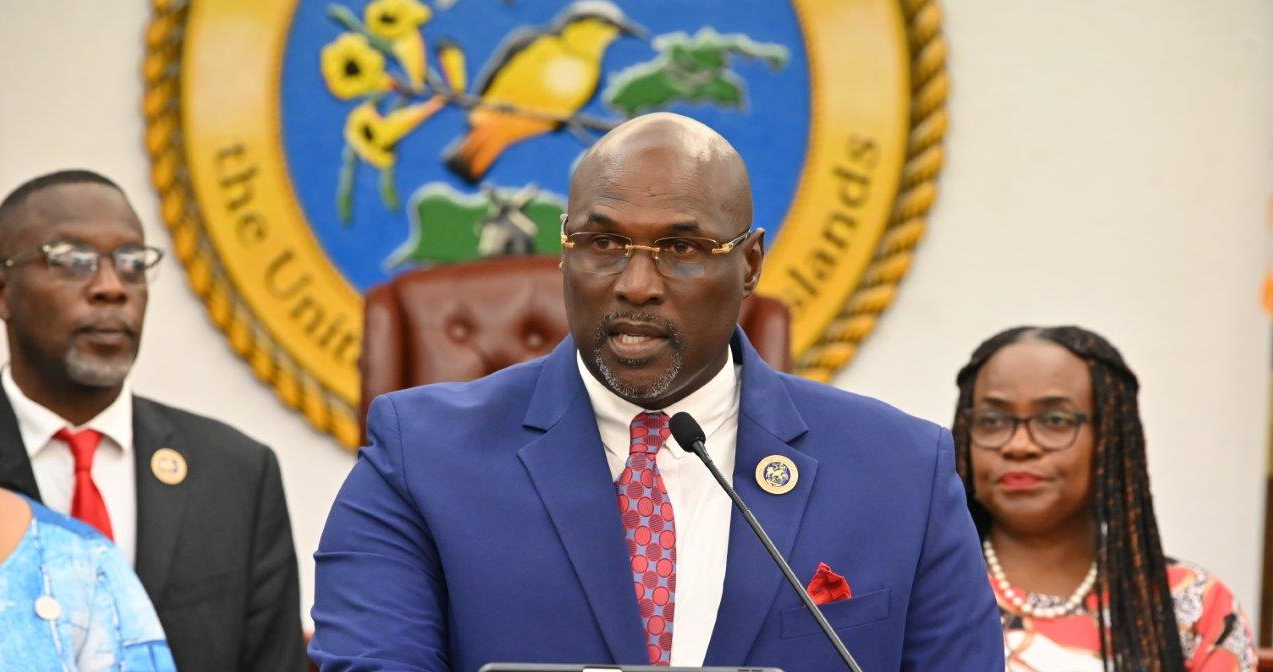
Virgin Islands legislators expressed dismay Tuesday at Gov. Albert Bryan Jr.’s declaration of emergency over the dire financial situation at the Water and Power Authority.
In a hastily arranged meeting on St. Thomas that preempted a scheduled Government Operations Committee hearing, the senators said they understood why Bryan declared an emergency to fund WAPA but implied it was the unreasonable result of poor planning and lack of transparency. Had executive branch agencies better informed and took advice from the Senate, the emergency could have been avoided, they said.
“My colleagues and I completely understand the devastating consequences if measures are not taken to keep WAPA solvent and operational,” Senate President Novelle E. Francis Jr. said. “What is missing from this entire exercise is accountability.”
Bryan declared the local emergency on Monday, saying bypassing usual Senate approval was necessary because of the situation’s urgency. He planned to tap directly into the territory’s $21 million Budget Stabilization Fund — also known as the Rainy Day Fund — to cover WAPA’s immediate obligations. Bryan planned to immediately address a $2.3 million debt owed to Aggreko, the company leasing generators to WAPA crucial for generating power.
Bryan said Tuesday the measure was critical to providing sufficient and reliable generation capacity to prevent rotating power outages in the St. Croix district. Bryan emphasized the necessity of this action: ”The state of emergency was a necessary measure to counteract WAPA’s challenges in maintaining normal generation capacity and to prevent the unacceptable alternative of rotating power outages that would impact our residents and businesses severely.”
WAPA’s inability to pay debts for fuel and equipment has led to disruptive service cuts, including rolling power outages, the senators said. Part of WAPA’s shortfall comes from an $11 million outstanding bill owed by the territory’s hospitals and the Waste Management Authority. Those agencies were not alone in being behind on their bills, however.
Sen. Donna Frett-Gregory, chair of the Committee on Budget, Appropriations, and Finance, said Bryan’s administration had every opportunity to avoid an emergency declaration. Had executive branch agencies come to their hearings with the full financial and operational data requested, she said, the Senate could have potentially advised and funded them better. The Senate has held countless meetings on WAPA’s operations, most ending in expressions of frustration.
To falter in informing the Legislature, then seek to bypass the Senate with an emergency declaration, was to sidestep the funding process outlined in the Revised Organic Act, she said. Rather than an emergency declaration, Bryan could have sent corrective legislation to be considered or called the Senate into a special session.
“Any decision to fund WAPA by using part of the General Fund of the Virgin Islands should be part of the legislative process,” Frett-Gregory said. “It is perplexing that the leaders of the Water and Power Authority and the executive branch leadership would wait until the 12th hour to take action and approach the Legislature in full crisis mode.”
Later, in a written statement, Bryan said the Senate had their chance when he called a special session in 2023, but they chose to largely ignore the issue.
“This emergency action follows a pivotal December 2023 meeting with members of the 35th Legislature, where Governor Bryan proposed a consolidated financial oversight measure for semi-autonomous agencies. This initiative was aimed at ensuring that funds allocated to these agencies are expressly used to fulfill their utility obligations. Unfortunately, this proposal was not taken up by the Legislature, leaving critical financial issues unresolved.
Any depletion of the Rainy Day Fund needed to be accompanied by a plan to refill the pot, Frett-Gregory said.
The 15 Senators had no prior warning before WAPA made the decision to conduct rolling blackouts, Frett-Gregory said. As she spoke, people on St. Croix reported their power was off.
The Senate and Bryan’s administration had been meeting specifically on the outstanding debt to WAPA for a year, she said. She pushed back on a suggestion that the hospitals were late on their bills because they had been underfunded. She said in 2022, 2023, and 2024 the Senate funded the hospitals $10 million more than what the Bryan administration had asked for.
“We have to do a better job of managing our resources,” she said.
Sen. Kenneth Gittens, an outspoken critic of WAPA, spoke by teleconference from St. Croix, saying Bryan had met the Senate’s efforts to reform the troubled utility with vetoes and lawsuits, rather than collaboration, he said.
“This administration has fought true reform at every turn,” Gittens said. “We have had to subpoena documents and officials from the authority, and even the Public Services Commission. We have granted this administration just about every request it has made regarding the authority.”
Gittens said leeway given to the authority included paving the way for a $45 million payment to propane supplier Vitol.
“And this body was not even allowed to see the settlement that was agreed upon with Vitol to supposedly settle this debt,” he said. “With outrageous debts to Vitol, Aggreko, and other vendors, as well as outrageous deals for smart meters that never worked properly, a crumbling infrastructure, and now the ultimate results being rolling blackouts — if our governor truly wants reform at the authority, why has the governor gone to the extreme of going to the court to fight against the restructuring of the Water and Power Authority board.”
Sen. Dwayne DeGraff said a resolution to the WAPA matter would require cooperation, not a one-man-show fix.
“We have to pump the brakes on the governor,” DeGraff said. “It cannot be where the governor calls the state of emergency we’re in because that makes everything we do here moot.”
Francis also acknowledged the need for working with the administration, to do otherwise would be to hurt the people of the Virgin Islands, he said.
“When the elephants fight, the grass gets trampled,” he said. “So we want to make sure we’re working with the executive branch.”


